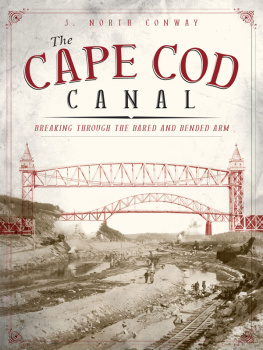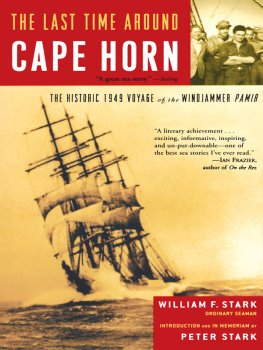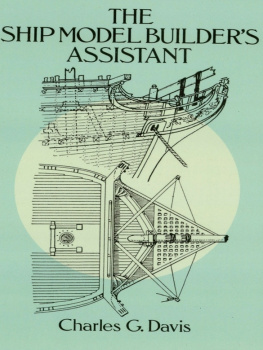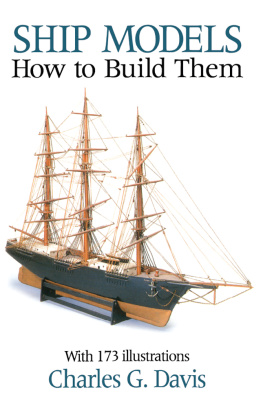Charles Davis - Around Cape Horn
Here you can read online Charles Davis - Around Cape Horn full text of the book (entire story) in english for free. Download pdf and epub, get meaning, cover and reviews about this ebook. year: 2004, publisher: Down East Books, genre: Non-fiction. Description of the work, (preface) as well as reviews are available. Best literature library LitArk.com created for fans of good reading and offers a wide selection of genres:
Romance novel
Science fiction
Adventure
Detective
Science
History
Home and family
Prose
Art
Politics
Computer
Non-fiction
Religion
Business
Children
Humor
Choose a favorite category and find really read worthwhile books. Enjoy immersion in the world of imagination, feel the emotions of the characters or learn something new for yourself, make an fascinating discovery.

- Book:Around Cape Horn
- Author:
- Publisher:Down East Books
- Genre:
- Year:2004
- Rating:4 / 5
- Favourites:Add to favourites
- Your mark:
- 80
- 1
- 2
- 3
- 4
- 5
Around Cape Horn: summary, description and annotation
We offer to read an annotation, description, summary or preface (depends on what the author of the book "Around Cape Horn" wrote himself). If you haven't found the necessary information about the book — write in the comments, we will try to find it.
Charles Davis was one of the worlds leading maritime model builders. During the first half of the last century, he was also acclaimed as an artist, historian, and author. This is his recollection of one of his first adventures at sea: sailing out of New York in 1892 on a voyage around Cape Horn, aboard the bark James A. Wright.
Around Cape Horn — read online for free the complete book (whole text) full work
Below is the text of the book, divided by pages. System saving the place of the last page read, allows you to conveniently read the book "Around Cape Horn" online for free, without having to search again every time where you left off. Put a bookmark, and you can go to the page where you finished reading at any time.
Font size:
Interval:
Bookmark:
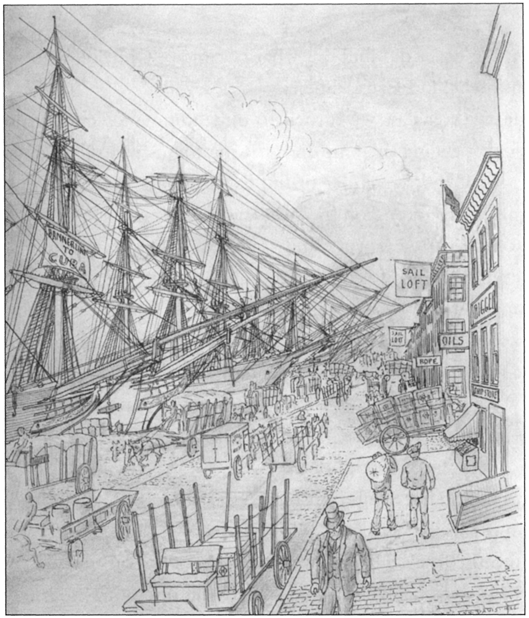
Rotten sailsStripping the barkI get impatient to go ashoreWe knock offI borrow money from the captainThe runners try to take my clothes bagA haircutThe mates row us ashoreOn our way to Philadelphia in the trainI go with Charlie to his friend's to boardWe meet our shipmatesA gold watchA temperance saloonWe go down to Wilmington and get paid offI buy a new suit of clothes and arrives home that nightThe end.
T hat night we stood anchor watches of one hour each. At six o'clock the next morning we washed down the decks and let all the sails loose to dry, for the sun had risen in a clear blue sky.
The sails by this time were rotten as punk. Many of them tore when we hauled on them, too rotten to bear their own weight. In fact, the fore upper topsail blew all to pieces with the gentle breeze that swelled the loose cloths.
Just before breakfast, a tug came alongside and the custom-house officers came aboard and examined our hatches to see that they had not yet been opened; then all hands were lined up on the poop again and our names were called off to see if all were there. We never did find out what became of Old Bill, who we had left on the mountainside behind Caleta Buena.
After a hearty breakfast we turned to unbending and sending down the sails that were now dry, rolling them up and stowing them away down in the sail locker. After that we spent the remainder of the day stripping off the chafing mats from the rigging and the rounding on the stays, racking off the halyards and all the running gear, except what we unrove and coiled away below. We quit work at seven o'clock that evening and I was mad with impatience to get ashore and go home.
"How much longer are they going to keep us lying here anchored in midstream?" I asked myself. And I lay awake a long time that night, thinking over what I would do when I got home and wondering what health I would find my folks in. For all I knew they might have died while I was away and I might find an empty home. Such thoughts as these kept passing through my mind and I longed to get ashore and get some news from home.
Next morning, May 18, after washing decks and doing a few small jobs such as putting the yawl on its davits, etc., we were told to "Knock off now!" and went scampering into the fo'c'sle like a lot of schoolboys just let out.
Clothes bags were hauled out and stuffed full of clothes, shoes, and bedding. When the runners arrived with a larger rowboat, nearly everybody piled into her, bag and baggage, glad to leave the bark.
I nearly had to fight with one of the runners to prevent him from taking my clothes bag into the boat. He insisted that I'd said I would go with him, but I got him to understand differently and got the cook to let me stow my bag in the galley while I went aft to ask the old man to lend me money enough to keep me until we were paid off
I found him in a very good-natured frame of mind; he laughed and joked, promising to give me five dollars and set Charlie and me ashore at the dock. He told me there was a train that ran up to Wilmington every night with the workmen from the dock, and that we would be able to go up in that train.
Then I went forward and told Charlie it was all right, that I would go with him, so the runners put off with the rest of my mates and disappeared up the river.
During the afternoon, Charlie cut off some of my hair, tor it was so long and curly it touched my shoulders and made me look like a wild man. When five o'-clock came around, we were rigged in our best shift, ready to depart. The old man came to the coach-house door and ordered the two mates to row us ashore. I could see they didn't like the job, the idea of a man, who had lorded it high-handed all the voyage, now rowing two ordinary sailors ashore. But it was the captain's orders and they had to obey. When all was ready, the mate suddenly remembered he had left his tobacco in his room and went back to get it, and again for his knife, until the captain came up on deck and told him to hurry up and put us ashore before the train left, or else we'd have to walk about five miles to Wilmington with our heavy clothes bags. This seemed to be just what the mate was trying to have happen, for he got the boat broadside on against the spiles of the dock, where the tide held her fast.
We shinned up on the dock and hauled the bags up after us, then we left the mates without so much as saying goodbye. We got on the train, which was filled with Negro workmen, and went up to the depot at Wilmington. Here we bought our tickets for Philadelphia and, while waiting for the train to come along, I sent a telegram to my mother, saying I would be home in a few days.
The sensations I felt sitting in the railroad car, watching the flying scenery along the line, are hard to describe. It seemed to me, as I looked down at my faded and worn blue suit and clumsy, convict-made shoes, as the was looking out through some other person's eyes. The other passengers in the car were all respectable, well-dressed people and it warmed my heart to see my native countrymen once more and feel the refinement a woman's presence causes among men. The children prattling away seemed music to my ears, which for nine months or so had heard nothing but the coarse talk of men, hardened to the world by the rough usage it gave them.
When I remembered how I was dressed, I felt my cheeks grow hot and I couldn't blame the passengers for looking at us with curious glances, for our make-up was certainly grotesque. The only head covering I had was a small round sort of cloth jockey's cap that had shrunk with the washing I had given it until it just encircled the back of my head, while from under it my hair protruded in shocking disorder. It refused all attempts of the brush to make it lie smooth, and twisted and curled in every direction. The high-back scats hid a good part of me, so only the shoulders of my serge suit could be seen. Charlie, in the seat behind me, was a giant in stature. He had on the remains of a brown derby that somehow or other he had kept stowed away all the voyage. The rest of his clothes were, like mine, sadly the worse for wear.
But we were glad enough to be ashore again, no matter how we looked, and the first thing we did as we stepped out of the depot in Philadelphia was to hunt up a barber shop and get a shave and a haircut.
We had some difficulty finding the street car that would take us out to where Charlie's friends lived, but by making inquiries we got aboard the right one, which took us to Richmond, as the northern section of Philadelphia is called.
Charlie had not been here in four years and, as we stood on a corner under a gas lamp trying to remember where his friends lived, a man came by and glanced at us. "Hello!" he shouted. "Is that you Charlie?" and who should it be but an old acquaintance of Charlie's.
He told us where the cigar store was, and as we went down a side street I saw a high fence ahead, at the end of the street, with a large gate.
"What's that, Charlie?" I asked.
"That's Cramp's Shipyard," he replied. And I looked tor the first time at the famous yard where many of our men-of.war are built.
Charlie's friends were located on a corner, where they kept the store and a boarding house. They were a thrifty old couple and received us with warm hearts as though we were their sons. But all the conversation was carried on in Prussian, of which I understood not one word. So while Charlie and all hands, including many friends who dropped in upon hearing that he was back, kept up an animated conversation, I sat waiting for the time when we should be shown our room, for I was tired and sleepy.
Next pageFont size:
Interval:
Bookmark:
Similar books «Around Cape Horn»
Look at similar books to Around Cape Horn. We have selected literature similar in name and meaning in the hope of providing readers with more options to find new, interesting, not yet read works.
Discussion, reviews of the book Around Cape Horn and just readers' own opinions. Leave your comments, write what you think about the work, its meaning or the main characters. Specify what exactly you liked and what you didn't like, and why you think so.


